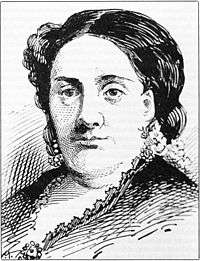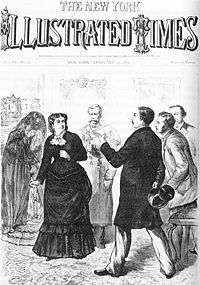Madame Restell

Ann Trow (May 6, 1812 – April 1, 1878), better known as Madame Restell, was an early-19th-century abortionist who practiced in New York City.
Biography
Restell was born in Painswick, Gloucestershire, England. Her father was a labourer. At the age of fifteen she started work as a maid in a butcher's family, and at sixteen she married a Wiltshire man called Henry Summer. After three years living in England, they emigrated to New York in 1831 where Summer died of yellow fever. Restell was forced to make a poor living as a seamstress.
Restell remarried in 1836, to a German–Russian immigrant, Charles Lohman, who worked in the printing trade. Lohman was a radical and freethinker, a friend and colleague of George Matsell (radical), the publisher of the radical journal the Free Inquirer. With Matsell, Lohman was involved in the publication of Robert Dale Owen's book Moral Physiology; or, a Brief and Plain Treatise on the Population Question (1831) and Charles Knowlton's Fruits of Philosophy; or, The Private Companion of Young Married People (1831).
Restell's brother, Joseph Trow, had also emigrated to New York, and was working as a sales assistant in a pharmacy. Restell began to develop an interest in women's health, selling patent medicine, and (probably in partnership with her husband and brother) creating birth control products such as "preventative powders" and "Female Monthly Pills", advertised under the name "Madame Restell". She sold these products through the post and performed house visits. The term "Restellism" became a euphemism for abortion.[1]

Her business was one of a number at the time, and like them was under constant attack by the respectable and the penny press. Newspaper editor Horace Greeley criticized other newspapers for accepting advertisements by Restell,[2] and George Washington Dixon of the Polyanthos as well as the National Police Gazette also refused her advertisements.
In 1841, Mary Rogers was found dead in the Hudson River. Newspapers suggested that she had died during an abortion carried out by Restell, although later evidence seems to contradict this. Regardless, abortion was soon outlawed. Soon it became legally defined as an obscene subject and was no longer covered in the papers.[3] Evidence given in a breach-of-promise case in 1854 suggests Restell and her husband were charging between $50 and $100 per abortion at this time and had a regular clientele. The complainant in the case claimed to have had five abortions over a period of seven years, of which three were performed by Restell. At this time abortion in New York was a felony punishable by not less than one and not more than three years in prison.[4] In a further court case Restell conceded she had arranged the adoption of an unwanted child.[5] Following Restell's arrest in early 1878, a maid discovered Restell in the bathtub at her Fifth Avenue home; she had slit her own throat on the morning of April 1, 1878. Upon her death, she was claimed to have been worth between $500,000-$600,000 ($12.3 million-$14.7 million in present-day terms[6]).
Literature
Ann Trow Lohman is acknowledged to be the inspiration for Kate Manning's heroine Annie "Axie" Muldoon in her historical novel My Notorious Life by Madame X, published on June 6, 2013 (UK) by Bloomsbury Publishing.
Madame Restell is also a prominent character in Marge Piercy's historical novel, "Sex Wars", which depicts the social and political climate surrounding women's sexual, physical, and reproductive activities during the Gilded Age.
See also
Footnotes
- ↑ Carlson, A. The Crimes of Womanhood, page 116 (University of Illinois Press 2009).
- ↑ Schudson, Michael. Discovering the News, page 20 (Basic Books 1981).
- ↑ Paul Collins, The Murder of the Century. p. 156.
- ↑ "New York Times". 14 February 1854.
- ↑ "New York Times". 17 December 1856.: Fredrica W. Michenger vs. Mary Lohman, alias Madam Restell, Supreme Court, 16 December 1856.
- ↑ Consumer Price Index (estimate) 1800–. Federal Reserve Bank of Minneapolis. Retrieved November 10, 2015.
External links
| Wikimedia Commons has media related to Madame Restell. |
- "In the Eye of Power: The Notorious Madam Restell" at the Wayback Machine (archived December 23, 2005) by Cynthia Watkins Richardson
- "Sins of New York As 'Exposed' by the Police Gazette" (1930) by Edward van Every
|